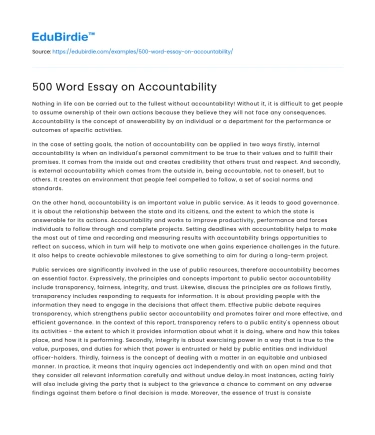Nothing in life can be carried out to the fullest without accountability! Without it, it is difficult to get people to assume ownership of their own actions because they believe they will not face any consequences. Accountability is the concept of answerability by an individual or a department for the performance or outcomes of specific activities.
In the case of setting goals, the notion of accountability can be applied in two ways firstly, internal accountability is when an individual's personal commitment to be true to their values and to fulfill their promises. It comes from the inside out and creates credibility that others trust and respect. And secondly, is external accountability which comes from the outside in, being accountable, not to oneself, but to others. It creates an environment that people feel compelled to follow, a set of social norms and standards.
Save your time!
We can take care of your essay
- Proper editing and formatting
- Free revision, title page, and bibliography
- Flexible prices and money-back guarantee
On the other hand, accountability is an important value in public service. As it leads to good governance. It is about the relationship between the state and its citizens, and the extent to which the state is answerable for its actions. Accountability and works to improve productivity, performance and forces individuals to follow through and complete projects. Setting deadlines with accountability helps to make the most out of time and recording and measuring results with accountability brings opportunities to reflect on success, which in turn will help to motivate one when gains experience challenges in the future. It also helps to create achievable milestones to give something to aim for during a long-term project.
Public services are significantly involved in the use of public resources, therefore accountability becomes an essential factor. Expressively, the principles and concepts important to public sector accountability include transparency, fairness, integrity, and trust. Likewise, discuss the principles are as follows firstly, transparency includes responding to requests for information. It is about providing people with the information they need to engage in the decisions that affect them. Effective public debate requires transparency, which strengthens public sector accountability and promotes fairer and more effective, and efficient governance. In the context of this report, transparency refers to a public entity's openness about its activities - the extent to which it provides information about what it is doing, where and how this takes place, and how it is performing. Secondly, integrity is about exercising power in a way that is true to the value, purposes, and duties for which that power is entrusted or held by public entities and individual officer-holders. Thirdly, fairness is the concept of dealing with a matter in an equitable and unbiased manner. In practice, it means that inquiry agencies act independently and with an open mind and that they consider all relevant information carefully and without undue delay.in most instances, acting fairly will also include giving the party that is subject to the grievance a chance to comment on any adverse findings against them before a final decision is made. Moreover, the essence of trust is consistency between what is said and what is done.






 Stuck on your essay?
Stuck on your essay?

